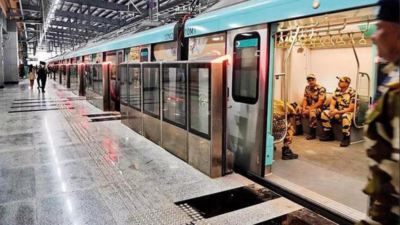- News
- City News
- mumbai News
- Pay minimum Rs 10, maximum Rs 50 for Aarey-BKC ride on Mumbai Metro 3
Trending
Pay minimum Rs 10, maximum Rs 50 for Aarey-BKC ride on Mumbai Metro 3
In October, Mumbai's Metro Line 3 will commence operations between Aarey Colony and Bandra-Kurla Complex with fares ranging from Rs 10 to Rs 50. The first phase features ten stations and aims to ease traffic congestion. Full operation will extend the line to Cuffe Parade with a maximum fare of Rs 70.

The first phase includes ten stations and aims to alleviate traffic congestion. Full operation will extend the line further, increasing the maximum fare to Rs 70.
The Mumbai Metro Rail Corporation Ltd (MMRCL) on Tuesday announced the fare structure for Metro 3's Phase 1 from Aarey-JVLR to BKC: Minimum will be Rs 10, and maximum Rs 50. Once the entire Metro 3 corridor, extending up to Cuffe Parade, is operational, the maximum fare will increase to Rs 70, MMRCL managing director Ashwini Bhide said.

The 12.4km Aarey-BKC stretch has 10 stations, providing connectivity to the international and domestic airports as well as Ghatkopar-Andheri-Versova Metro 1 at Marol Naka station. According to official sources, Phase 1 of Metro 3 is likely to be inaugurated by PM Narendra Modi along with other infrastructure projects in the state in the first week of Oct.
After Phase 1 route opens, passengers will be able to purchase tickets via QR codes, available in both print and digital formats, Bhide said. While the National Common Mobility Card (NCMC) system has been installed, it will become operational about a month after Phase 1 launches, she added. The National Common Mobility Card allows users to make payments across different segments like Metro, bus, suburban railway, tolls, parking, smart cities, and retail using their debit or credit cards. The stored value on the card supports offline transactions, ensuring minimal financial risk for stakeholders. It also supports operator-specific applications such as monthly passes and season tickets.
Bhide further said that 96 services will be operated daily during Phase 1. "On weekdays, services will run from 6.30am to 10.30pm, and on holidays, they will operate from 8.30am onwards," she said. Once the entire 32.5km Colaba-Bandra-Seepz Metro 3 corridor is commissioned, MMRCL expects a ridership of 14 lakh, with about 4.5 lakh passengers during Phase 1. The second phase of the project — Dharavi-Cuffe Parade stretch — is scheduled for completion by March-April.
According to Bhide, up to 15% of the suburban train passenger traffic may shift to Metro services after the full Metro 3 corridor becomes operational.
The Metro line is expected to reduce daily vehicular trips by 6.65 lakh, lower fuel consumption by 3.54 lakh litres per day, and reduce road traffic by 35%.
End of Article
FOLLOW US ON SOCIAL MEDIA










